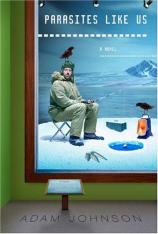Parasites Like Us
Review
Parasites Like Us
Adam Johnson's debut short story collection EMPORIUM was published
to near universal acclaim, with the New York Times's Michiko
Kakutani praising Johnson's "idiosyncratic and compelling voice."
Now, with the publication of his first novel PARASITES LIKE US, a
satire of sorts that is neither particularly idiosyncratic nor
compelling, Johnson attempts to live up to the mega-praise
generated by his first volume.
PARASITES LIKES US concerns the follies of a trio of
anthropologists at The University of Southeastern South Dakota, the
principal of which is a boozy, asthmatic teacher named Hank Hannah,
whose specialty is the Clovis people. Hannah's hypothesis is that
the Clovis people thrived in North America for 300 years until they
depleted their resources, including thirty-five species of mammals
they killed with an ultra-effective weapon indigenous to their
culture, the Clovis blade. Two students join Hannah, one of them a
brilliant anthropologist named Eggers (wink-wink), a man so
dedicated to his research that he lives like a Pleistocene caveman.
He doesn't bathe, he dons animal hides, and he squats in a
makeshift lodge made from mammoth tusks; in other words, an
exaggeration of a campus eccentric. There is also Trudy, who pales
next to Hannah and Eggers, as though Johnson didn't quite know what
to do with her.
The story begins when Eggers approaches Hannah with a prehistoric
spear point he has found, a Clovis point no less. Eggers, a
publicity hound like his real-life namesake, manages to convince
Hannah to try the blade on a live pig. They do; the blade works
perfectly and the pig dies. Eggers then leads the hungry Hannah to
the 3,000 year-old gravesite that yielded the blade and that
resides --- conveniently enough --- not far from the campus itself,
near an Indian casino. Hannah reluctantly agrees to rummage around
the site without going through the appropriate bureaucratic
channels, unearthing a pile of male bones they name Keno, and the
result is the release of a deathly plague. Meanwhile, Hannah is
arrested for assaulting a police officer and tampering with the
gravesite and is sent to prison, where he flounders while an
apocalyptic plague rages throughout the world. Hannah escapes, and
the rest of the book is mayhem.
The above summary may give the impression that PARASITES LIKE US is
a terse, plot-driven work. Despite its clean prose, however, there
is little plot momentum. One of the features of genre writing ---
why, in fact, it's considered genre in the first place --- is that
it foregoes certain atmospheric descriptions and character
delineation in favor of action, drama and flux, none of which are
presented in PARASITES LIKE US. Johnson seems to want it both ways:
a narrative that is character-driven and plot-fueled.
Unfortunately, it suffers from too little of both.
For instance, Hannah and Eggers unearth the Clovis gravesite on
page 61 and the consequences aren't fully unleashed until page 200
or so. In between, the book dithers around. Hannah flits after a
Russian botanist, who speaks in a broken English meant to be
amusing but is merely silly. Hannah's attraction for her is never
satisfactorily explained, nor is it credible, remotely funny or
interesting. When not cavorting with Julia, Hannah is regaling his
father or his friend Farley, an ice fisherman. These haphazard
exchanges have the casual randomness of a Seinfeld episode,
without the latter's laughs.
Another problem with the book is that PARASITES LIKE US lacks the
punch of a more verbally effusive Will Self or Jonathan Lethem,
both cross-genre writers. The writing is breezy and informal. Not a
single phrase or line of description lingers in the memory. The
dialogue is stilted, and written, not said: "I asked him,
'Won't this contaminate the site?' Eggers shot back, 'I think we
can manage some things on our own - like telling a Pleistocene-era
artifact from a barbecued baby-back rib.'" These are one-liners
more fitting for teleplays than literary fiction. Written from
Hannah's perspective, we are given only his perception of events,
which robs the other characters of depth, as we don't have access
to their minds --- but maybe that's a good thing after all. At
times Hannah sounds more like an overeducated slacker than a
renowned anthropologist with provocative insights. The book
actually contains the embarrassing line: "That doobie gave him a
serious case of the munchies, I thought as Eggers droned on and on
about his diet." This is humor?
At the novel's conclusion, Johnson does sport a darker, more
ominous hat. Hogs are being burned in giant pyres, rampant dogs are
scavenging the landscape, birds have been vanquished, and humanity,
except for a token few --- the protagonists, of course --- is
breathing its last gasps. Yet Johnson hasn't earned the right to
impose such darkness on the reader, not after almost two hundred
pages of half-farcical scenes, including a long and detailed
account of two cars sinking through the ice into a lake.
Furthermore, Hannah never stops to consider what the implications
are of what he has done, and he even says at one point: "I knew
Trudy and Eggers' excavation was still wrong, that the whole
project was undertaken in bad faith, but I must admit that a
feeling of well-being had spread over me at the idea that Trudy had
learned a thing or two, that I'd taught her something."
The result is a tepid novel, competently told, but lacking in both
drama and credibility, and just safe enough for the palates of
Generation X.
Reviewed by Michael Leone (mleone@hotmail.com) on January 22, 2011
Parasites Like Us
- Publication Date: August 18, 2003
- Genres: Fiction
- Hardcover: 352 pages
- Publisher: Viking Adult
- ISBN-10: 0670032352
- ISBN-13: 9780670032358




